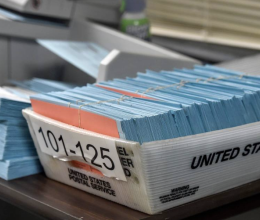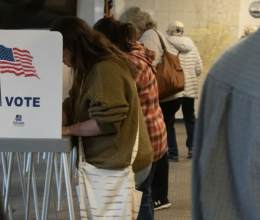
Proposed Congressional Redistricting Maps
Testimony of Aileen Berquist
Community Engagement Manager, American Civil Liberties Union of Kansas
Senate Redistricting Committee
Thursday, January 20 th at 12:00 PM – 348-S
Committee Chairs and Members of the Senate Redistricting Committee,
Thank you for the opportunity to present testimony today. My name is Aileen Berquist. I am the Community Engagement Manager and lobbyist for the ACLU of Kansas. We are a nonpartisan, non-profit organization that works to preserve and strengthen the civil rights and liberties of every person in Kansas.
During last summer’s town halls, we saw a phenomenal outpouring of civic engagement from our communities. Kansans from across the state tuned in, showed up, and provided comment on redistricting. Two themes came across loud and clear:
- Calls for committee leadership to commit to a fair, accessible redistricting process
- Calls to keep Johnson and Wyandotte counties together.
Of the more than 500 pieces of testimony, more than half emphasized that second point.
Unfortunately, this week’s proceedings ignored both of these requests. The Ad Astra map brought by the committee chair bi-sects Wyandotte county. It breaks up the urban corepotentially disenfranchising a concentrated community of people of color—and disregards entirely the calls from hundreds of Kansas voters to keep their community intact.
It is also important to note that the process this week has been neither fair nor accessible. Congressional maps were introduced on Tuesday. Hearings on those maps were scheduled for Thursday. Committees must receive testimony at least 24 hours prior to the committee hearing. For any normal bill, that’s a tight turnaround—but possible. But this is redistricting, and these are maps that have complex, underlying data sets. Those data sets were not made available to the public for review before the testimony deadline. Without the data sets, it is impossible to evaluate whether these maps are legal or constitutional. They might as well just be pretty pictures. It’s like holding a hearing on a bill with provisions missing and expecting people to vote on it sight unseen.
To make this even more clear: without access to the data underlying these maps, it is impossible to analyze the maps with any specificity to determine whether there is partisan or racial gerrymandering at play—and to what degree.
The speed at which this committee moved from introduction to hearing is troubling. The lack of publicly available data to allow for a legitimate analysis of the maps provided is troubling. The complete disregard for the will of the people—who were very clear they wanted to keep the 3rd district together—is troubling. We ask committee leadership to rethink their course of action: slow down the process, allow reasonable time for public comment, provide all information on maps publicly, and listen to the people with regard to district 3. We have a long process ahead of us before we get new maps—we should do this the right way.



